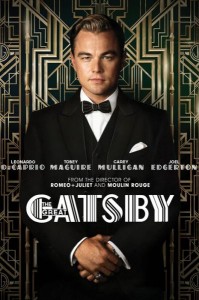 Now this is a great Great Gatsby.
Now this is a great Great Gatsby.
I’m not even a fan of Baz Lurhmann, who directed this 2013 adaptation of F. Scott Fitzgerald’s novel. Lurhmann is a hyper-kinetic director whose style often becomes a distraction.
You see, that’s my biggest pet peeve when it comes to movies.
When the director’s camera becomes another character in the film (for example, when hand-held camera work makes a movie so jerky one gets nauseous attempting to watch it), I immediately lose interest. I walked out of The Hunger Games for that very reason. It was impossible to watch.
In Lurhmann’s case, his fanciful, over-the-top settings, quick cuts, and boisterous music make movies I would never number among my favorites.
Except for this one.
This adaptation of The Great Gatsby offers the best Daisy Buchanan (Carey Mulligan), the best Nick Carraway (Tobey Maguire), the best Gatsby (Leonardo DiCaprio), the best Tom Buchanan (Joel Edgerton), the best Jordan Baker (Elizabeth Debicki), and the best George Wilson (Jason Clarke).
It also offers the best acting, the most compelling cinematography, the best costumes, the best lighting, and the best narration of any of the previous three Gatsby adaptations.
Lurhamnn’s Gatsby is electric. It crackles with a palpable energy that permeates every scene.
In short, it is a spectacle.
In addition to being the most creative and colorful Gatsby, Lurhmann’s film breaks from tradition by using contemporary, mostly Hip-Hop, music instead of 1920s Jazz and Flapper-style music. The juxtaposition shouldn’t work. But it does. Using contemporary music makes the film seem even more alive, and certainly more relevant.
Maguire’s Carraway gives the movie the much-needed plumb line via heartfelt and colorfully voiced narration that starts and ends the telling of this tale. Maguire doesn’t just deliver the lines. He acts them, giving them inflection, drama, enthusiasm. He speaks his lines as if he actually lived them. All previous Carraways spoke the lines as if they were paid to do so.
Joel Edgerton’s Tom Buchanan is compelling and holds his own against Maguire and DiCaprio.
Leonardo DiCaprio’s Gatsby is attractive in a Robert Redford sort of way, but more complex, more intense than previous incarnations of Gatsby. I don’t know if dare say this. But I think DiCaprio is a better actor than Redford.
But it’s Carey Mulligan’s Daisy that I consider the jewel in this star-studded film. Mulligan outshines all previous actresses who played the iconic role. She is beautiful, all doe-eyed and sensuous. But she’s not manic or crazy like Mia Farrow’s 1974 Daisy, or Betty Field’s 1949 Daisy. And she’s not bland like Mira Sorvino’s 2000 Daisy. Mulligan’s Daisy has depth, a sexiness that helps us see why Gatsby covets her, and a vulnerability that makes us understand her emotional weakness.
I almost didn’t see Lurhmann’s Gatsby. I remember watching the trailers in the theaters for months (and months and months and months) before the movie was release. The trailers made the movie look goofy, typical Baz Lurhmann. I had remembered the Redford/Farrow version of Gatsby and I thought Lurhmann’s was superfluous. And crazy looking.
But I took a chance on it one evening at the cheap-movie theater.
I was blown away.
Maguire’s narration hit all the right notes, successfully walking the line between maudlin and profound. That’s when I realized the reason the other adaptations failed is because the Carraway character was very, very weak, with narration too sparse or not there at all.
As soon as the Blu-ray was released, I bought it. (You can buy a copy for yourself here.)
I’ve watched it several times since, just as I’m watching it now.
Even the famous shirt scene with Gatsby throwing his custom-made clothes at a wide-eyed Daisy is better in this film.
As far as I’m concerned, Lurhmann’s 2013 adaptation of The Great Gatsby is the definitive version of F Scott’s book.
